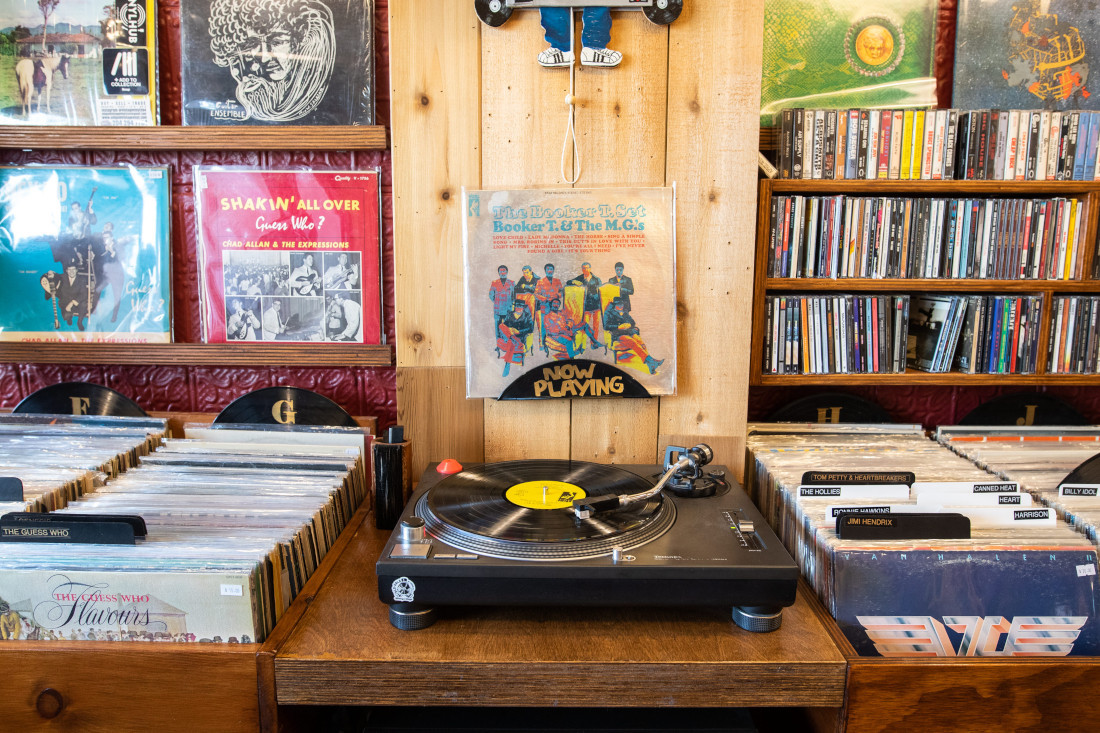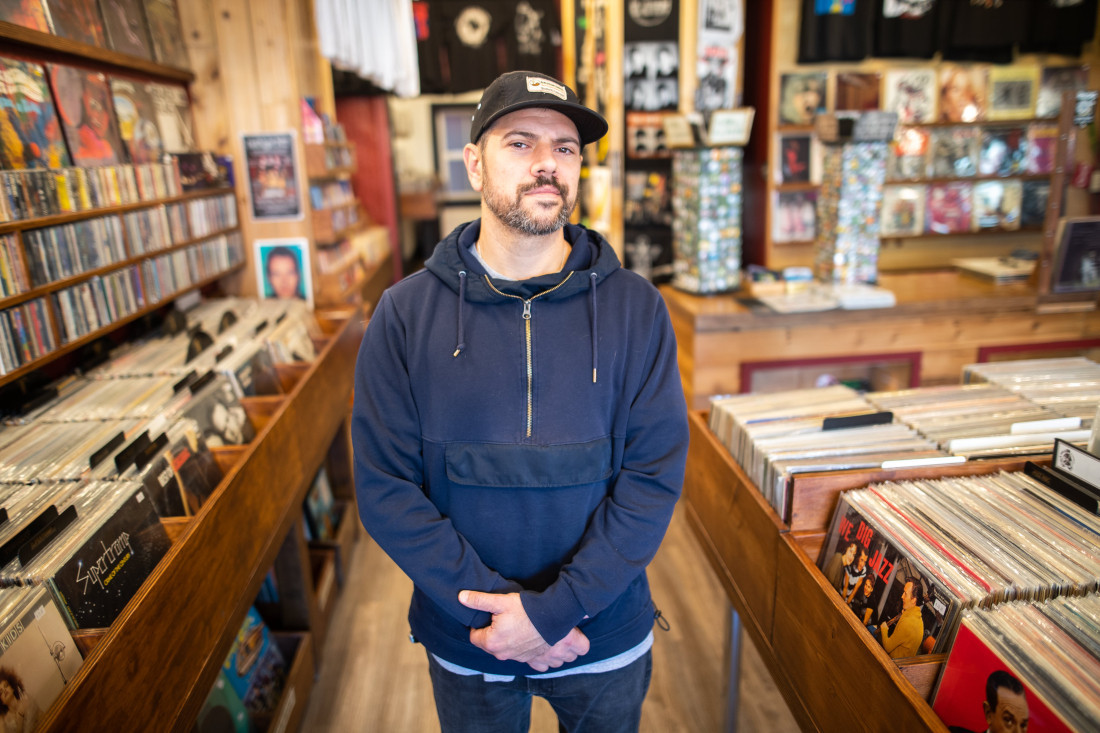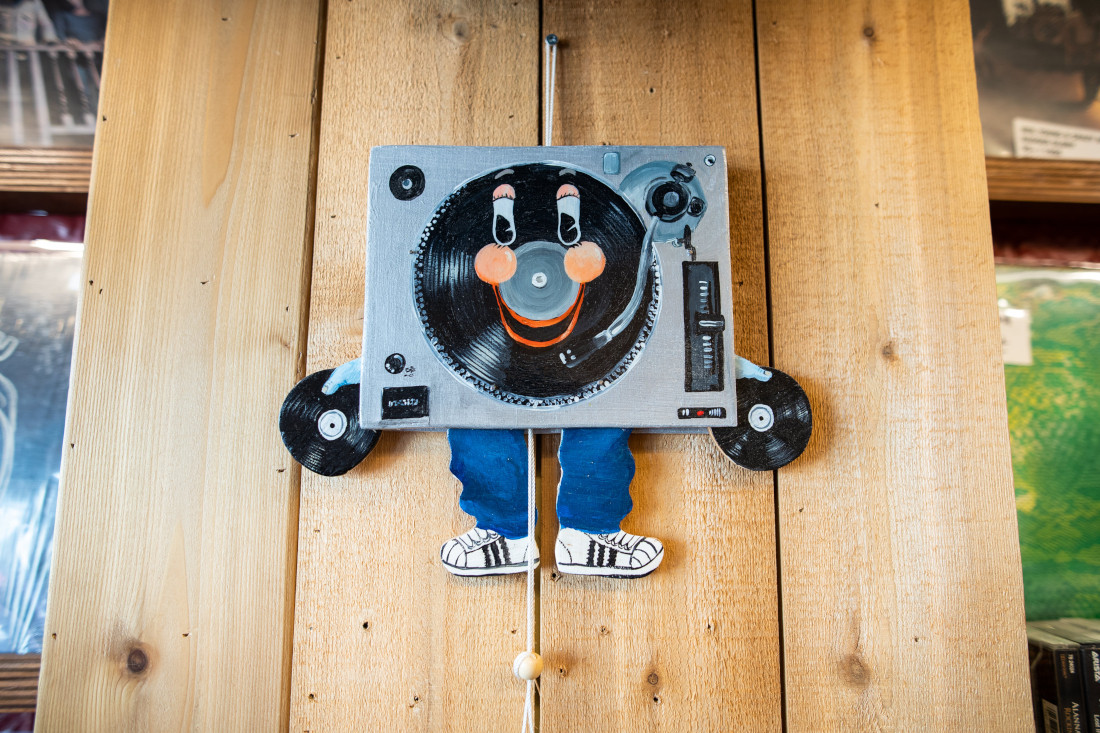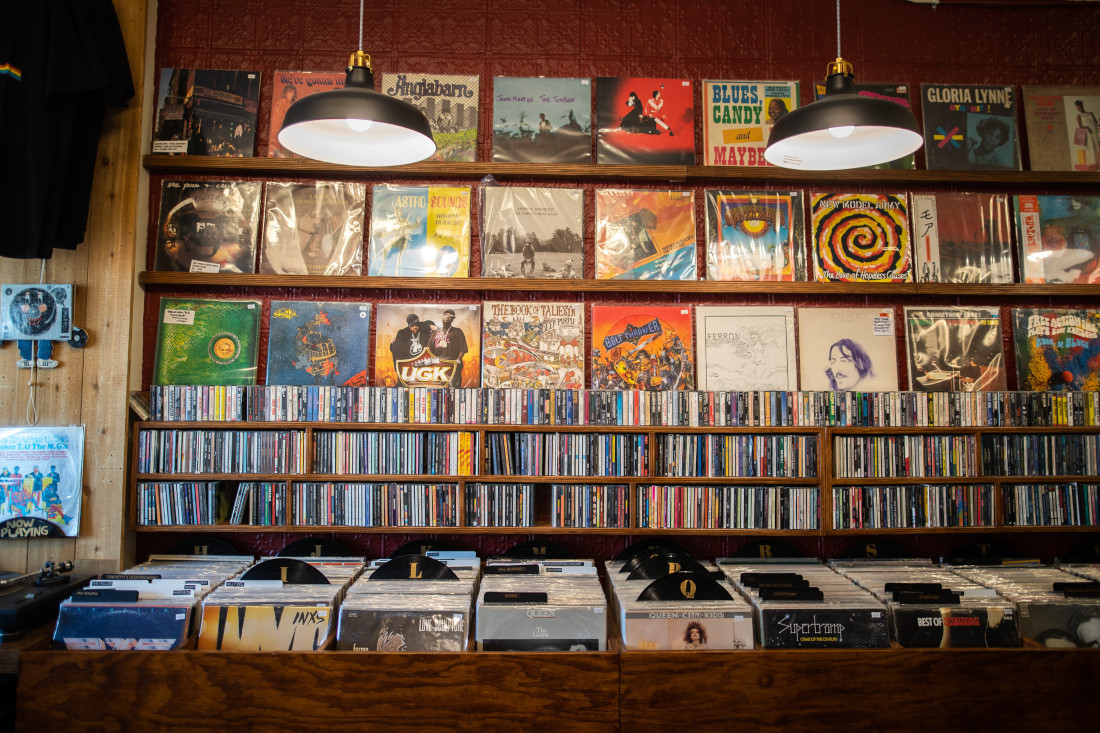The beat goes on
Winnipeg’s record stores on weathering the pandemic and an ever-changing market
Musician and Into the Music employee Jason Churko has always felt at home in record stores. He fondly recalls early memories visiting music shops, which were among his most formative experiences as a child.
“When I was little, I remember when my parents would take me to these department stores. I would head for the music department,” Churko says. “I wanted to see album covers, and I thought it was so neat.”
“I do remember just becoming a teenager and going to Records on Wheels downtown ... it was loud. They had crazy punk-rock records and heavy-metal records, and it was all super exotic. They didn’t have Anne Murray records. It was intense in there.”
It was only natural, then, for Churko to immerse himself in such an environment and make a living out of it, having worked at Into the Music since its takeover of Music Trader.
“Music has just always been my main passion, so it was always a fun job (meeting) lots of interesting people and always getting to hear new things,” Churko says.
For years, the record store has stood as an understated bastion of culture. Amid continuous technological innovations in the music industry and an always fickle market, local music shops persevere and remain staples of the community. But it hasn’t all been smooth spinning.
Owner, manager and founder of Into the Music, Greg Tonn, says that through their storied 35-year history, it’s been largely a struggle. He muses on the vicissitudes of the business.
“I had a coffee bar in my original store, which was an utter failure ... I didn’t know how to run a coffee bar,” Tonn says.
Tonn, a business graduate of Red River College who became fed up with the corporate environment in which he worked, established Into the Music in 1987. Armed with his personal collection of 1,500 records and a list of dos and don’ts amassed from visiting other Winnipeg record stores, the business was born.
Of the numerous record stores that populated the city during Into the Music’s inception, such as Records on Wheels, Autumn Stone and Opus 69, to name a few, only one other remains: Argy’s in St. Vital.
“The business has changed a lot since 1987. If we still ran the business the same way, we’d have been a dinosaur, extinct a long time ago,” Tonn says.
“There are so many things that are different. The internet has changed everything about how people discover and people buy their music. Streaming has changed a lot of things. What we’ve done is anticipate as best we can, but mostly we’ve been responding when the marketplace changes. We change along with it.”
Perseverance through plague
The COVID-19 pandemic was a Herculean challenge to surmount for most small business owners struggling to get by. For Brent Jackson, founder and proprietor of Old Gold Vintage Vinyl on Osborne, COVID-19 was a gateway into a new life.
“I took it seriously when the pandemic happened, and I lost my full-time job. I had a different career before I started this, and I had no other option except to dive into something I was really comfortable with and felt like I could succeed at,” Jackson says.
One of the challenges stores like Into the Music and Old Gold faced during the pandemic were the supply-chain issues plaguing a myriad of different industries. As demand rose, pressing plants were mostly unable to keep up, and that left stores empty-handed.
“Some of the catalogue has not been available for months. We have a number of suppliers, and, largely, it’s the same suppliers for all of the music retail industry in North America, in Canada. New releases are sometimes months between when a digital stream is available and then the physical,” Churko says.
Into the Music faced similar issues in 2019 when a dearth of secondhand stock led to the Osborne location’s closure.
Despite the issues with inventory, or lack thereof, the indoor and solitary nature of the hobby ensured financial stability not necessarily afforded to other small businesses.
“The last two years, there’s been a strong upswing in interest in music. I think that was accelerated by the onset of the pandemic,” Tonn says.
“Even through COVID, it was surprisingly steady. We had lots of support from our customers and from the community,” Churko says.
COVID-19 may not have cut too heavily into profits, but it did preclude one of the main appeals of music shops: the element of tactile appreciation.
“At some point, we were just doing curbside pickup. We were even doing home delivery. That really affected people’s ability to browse and discover and listen to things at the listening stations, which is a huge part of record stores,” Churko says.
Without the ability to persuade window shoppers into becoming regular shoppers, Jackson opted to step up his online presence to attract customers.
That involved “posts every day, a lot of internet content to get people to pay attention and maybe get interested in the things we were selling,” Jackson says. “If you’re sitting on the couch looking on your phone, I want people to stop for two seconds and look at that.”
Into the Music staff also mourn the loss of shows hosted at the store following the pandemic, although Tonn assures that “we’ll get to it again someday.”
The online opposition
The advent of the digital age has had a large impact on the record business, even setting aside illegal music distribution and streaming services. Online marketplaces like eBay and Discogs have allowed vinyl enthusiasts to set up shop with their collections, modest or massive, with a few clicks of a button, and it butts into brick-and-mortar store sales.
“Now you can legitimately say that the online marketplace is so vibrant. It takes away sales you could be getting,” Tonn says. “With the pandemic, people are doing a lot more buying online.”
Tonn recalls an anecdote from the early days of online selling, before even virtual storefronts dedicated to music took off.
“About 15, 20 years ago, I was online, and I found a Winnipeg guy selling stuff on eBay. Right at the bottom, it said, ‘I shop the local record stores’ ... I’m realizing all the stuff that I was selling to him at $5 and $8, he was selling for $20 and $30.”
Jackson, who himself was selling records on Discogs in its early days to then fund his own purchases, also notes the ramifications of an influx of armchair entrepreneurs.
“It’s an interesting market, because you’re dealing with a strange factor that a lot of your customers also have Discogs pages ... online. It’s super saturated. Everyone buys records to flip records to buy more records. Oftentimes, my competition is my customers,” Jackson says.
Give me convenience ...
In a time when new releases pop instantaneously onto mobile devices the second the clock strikes midnight, it begs the question: why bother? What’s the incentive for a more labourious and expensive way of listening to music?
For Churko, there’s an ineffable facet of the vinyl experience that can’t be replicated elsewhere.
“Everybody realizes the infiniteness of the internet, but we’re physical beings. To be in a physical space, surrounded by things you’re passionate about or your interests, it’s just different ... For younger listeners and people just discovering music, and for the future, maybe that experience will be lost on them.”
Among the purveyors of wax, a consensus is reached: the social aspect of the record store cannot be understated.
“(When people visit us), you’re able to turn people on to certain things, but people are doing that on their own now in the comfort of their homes,” Churko says.
“My customers are extraordinary ... when you get them engaged a little bit about what they’re listening to, you really get that sense of not just the passion or love of music, but how much they know,” Tonn says.
The devotion and preparation of the music is said to be an important ritual in and of itself. For Tonn, part of the appeal is the process, echoing the sentiment from French author Antoine de Saint-Exupéry: “it is the time you have wasted for your rose that makes your rose so important.”
“I still equate purchasing music in a tangible form to slow food ... you buy your own ingredients, you take your time cooking it, you savour it and appreciate it so much more because of the effort you’ve put in,” Tonn says.
“The experience of listening to stuff on your phone and online is that you tend to skip a lot of stuff. You tend to not listen to whole albums. You tend to listen to single tracks. Sometimes it functions almost as aural wallpaper. It’s in the background all the time.”
Jackson echoes the sentiment of superficial listening in a time when music is accessible virtually 24 hours a day, and attention span is at an all-time low.
“That’s an indulgence that we as people deserve to have. Just close the door to your room, put a record on, do what you do. It demands a bit of attention. I think it does something for your soul and your wellbeing,” Jackson says.
“Light on the porch”
Naturally, those working in the business insist that there’s more to the record store as an institution than mere commerciality.
“I’m only recently understanding of Into the Music’s place in the people’s minds in terms of the arts and business landscape. It’s not just a place you buy stuff. We’re part of the community,” Tonn says.
“It just feels like a great hub to discover and to have conversations. It’s also great being in this neighbourhood. We have the Cinematheque and the (Winnipeg) Film Group right around the corner from us. There are other businesses in the area that are places where people gather to hang out and to socialize. I feel like, somehow, we’re a part of that,” Churko says.
“Our culture, our history is on records. Ideas are all on vinyl. It’s very important in a cultural sense. It’s where music and counterculture meet ... I think after humans are gone, they’re going to be finding records hundreds of years from now,” Jackson says.
“We’re always sort of that light on the porch kind of thing. The people who seek it out, they will come.”
Published in Volume 77, Number 07 of The Uniter (October 27, 2022)











